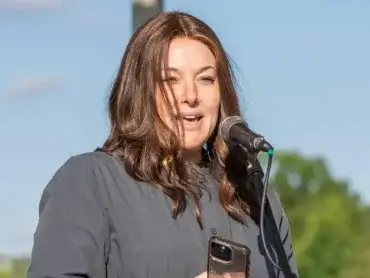Here’s How The Orthodox Community Is Responding To My Unorthodox Life
The hotly contested reality television series My Unorthodox Life debuted las week on Netflix and has inspired a cadre of criticism, backlash and responses that aim to educate its subject, formerly Orthodox Julia Haart, Netflix, viewers and the media at large that this is not a monolithic view of religious Judaism.
Jew in the City’s own Allison Josephs penned this response in JTA, saying that the constant othering of Orthodox Jews as puts them at risk, and suggests a new Hollywood narrative that paints religious lifestyle in a positive light, showing a wayward Haredi Jew re-engaging Judaism from a healthy place, as Makom members do. The piece was subsequently picked up by the Jerusalem Post, The Forward and the Times of Israel.
Jewish Journal had this eloquent response, blaming the media for going after Orthodox Jews once more, and begrudging the use of the term “Unorthodox” as it consistently paints Jews who identify as Orthodox in a bad light (as opposed to understanding the specific experience of the individuals who were hurt and went off the derech.)
Algemeiner picked up on the #myorthodoxlife social media campaign, highlighting several of the posts that Orthodox Jewish women have penned to show how they are neither subjugated nor forced into their joyous, meaningful lifestyles.
This Glamour Magazine article explained that while the show might be entertaining to some, the damage that it can potentially do to Orthodox Jews is irreversible and even could put lives at risk. The article suggests that the responsibility to rectify this lies with Haart herself.
If you found this content meaningful and want to help further our mission through our Keter, Makom, and Tikun branches, please consider becoming a Change Maker today.








3 comments
Sort by
I’m wondering where our philanthropists are. Have any of them given a thought about sponsoring a project that would show Judaism – and especially baalei teshuva – in a positive light, and sell (or, even better, donate) it to Netflix? That could potentially make a much bigger difference than a bunch of new Torah scrolls or hospital pavilions.
I am up in the air about Julia Haart’s Netflix show; however, I do have a question about marriage in the Hasidic community. I have heard from some people that they believe Hasidic couples are not married according the laws of their state, but only according to the Jewish Law. Is that true? Please let me know.
Thank you.
Thanks for your comment. Unfortunately, there are some people who don’t get married legally to collect benefits as single parents. It’s awful and wrong but I will explain how they justify it: in the old country, Jews were given extra taxes as a penalty for being Jewish. Jewish law says the law of the land is our law too. We must be law-abiding citizens. However, if a law discriminated Jews, we had permission to not follow it. Unfortunately, this mindset has traveled to modern times and some people believe it’s unjust to pay taxes even though it’s not targeting Jews. So they find a way around it. It’s completely against Jewish law and very embarrassing. And it must be addressed. There are cheaters in every society. But when a person dresses his sin up as a religious act, it makes the sin even that much more repugnant.